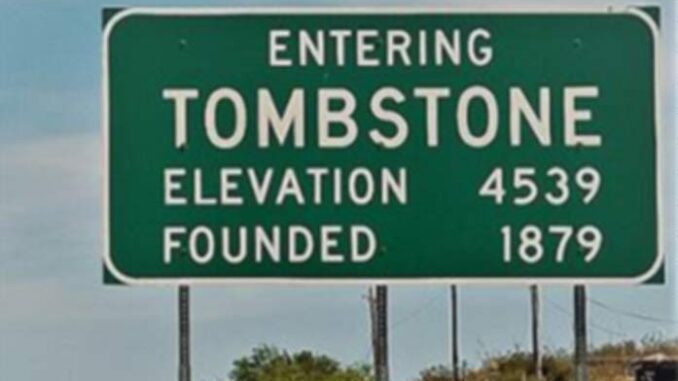
A Cochise County judge ruled Monday that a sergeant with the Tombstone Marshal’s Office provided enough circumstantial information to search a local man’s residence in 2019 for evidence from a burglary but the judge must still rule whether the sergeant acted recklessly by arresting the man without any direct evidence connecting him to the burglary.
Judge Jason Lindstrom issued the ruling in a lawsuit filed by Matthew Jordan King against the City of Tombstone, then-Marshal Bob Randall, former TMO Sgt. Travis Mattern, and others stemming from King’s Jan. 28, 2019 arrest on residential burglary charges. There was no witnesses, no DNA, and no fingerprints tying King to the crime.
What Mattern did have was several large-size shoeprints inside and outside the victim’s home made by a distinctive Nike slip-on walking shoe. He also knew King lived within walking distance of where the footprints ended, had big feet and a fondness for Nikes, and hung around with known criminals.
TMO personnel also located a set of Nike shoeprints at a local cemetery where King had been seen within hours of the burglary which happened on Jan. 26. It was enough information to get a warrant to search King’s family home although no evidence was recovered in connection to the burglary.
Still, King was booked into the Cochise County jail where he remained overnight until his family paid a non-refundable 10 percent fee to obtain a $25,000 bond to secure his release.
But while King was still in jail, the Cochise County Sheriff’s Office responded to an armed robbery in the Palominas area south of Sierra Vista. Three men wearing face coverings broke into the home of an elderly woman, who was beaten with a pipe in an effort to coerce her to surrender her jewelry.
Items from the Tombstone burglary were found in the home of a suspect in the Palominas robbery. Nikes with a shoeprint similar to those found in Tombstone were also recovered.
Days later, King’s charges were dismissed at the request of the Cochise County Attorney’s Office, but it did not clear King’s arrest record. King then sued for false imprisonment, battery, assault, and intentional infliction of emotional distress, as well as negligence. He also alleges one or more members of TMO knowingly aided and abetted Mattern in “harmful and or offensive conduct” and that city officials were negligent in supervising the marshal’s office.
Andrew Petersen, an attorney for TMO’s insurance provider, has argued King’s arrest was based on a “validly issued warrant” and that Arizona law protects peace officers by providing qualified immunity – what is generally considered “the right to be wrong.”
Under qualified immunity, a peace officer can only be held liable if the officer knew or should have known he or she was acting “in reckless disregard of whether the officer’s conduct would deprive another person of their rights.”
On Monday, King’s attorney Joel Borowiec presented evidence that Mattern had access to crime scene photographs taken in and around the burglarized house which showed the shoeprints were “obviously different” from the shoeprints seen at the cemetery. Mattern had described the two sets of shoeprints as “substantially similar” in his affidavit for the search warrant.
“Substantially similar doesn’t cut it. Either it’s going to be an exact match or not,” Borowiec argued in support of invalidating the search warrant. “It’s guesswork, it’s patchwork, it’s not reasonable. It was reckless.”
Petersen argued that probable cause for a search warrant is “a low bar” and the totality of the information Mattern had at hand was sufficient. The judge agreed, noting the warrant to search a suspect’s residence “was a logical progression” intended to look for evidence to further the investigation.
As a result, Lindstrom dismissed the claims in King’s lawsuit directly related to the search warrant. The question now for Lindstrom is whether a jury gets the chance to decide if anyone from TMO acted in a reckless or negligent manner by making the arrest despite a fruitless search which failed to connect King to the burglary.
Or the judge could rule King’s arrest was a simple mistake of professional judgment for which qualified immunity applies and the rest of King’s lawsuit would have to be dismissed. Lindstrom took the qualified immunity issue under advisement and will issue his ruling at a later date.
According to court records, Ryan Caveman Melton is serving a 20-year prison sentence after pleading guilty to participating in the Palominas armed robbery. His plea deal states he cannot be charged for committing the Tombstone burglary. Melton also wore large-size Nike shoes.
